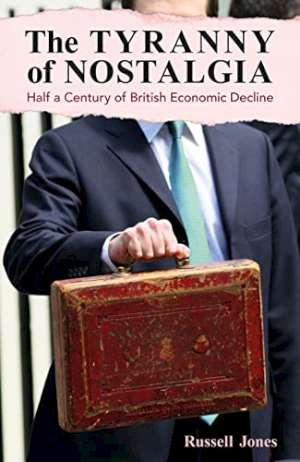27 April 2023
The Tyranny of Nostalgia
Half a Century of British Economic Decline
Russell Jones
2023, London Publishing Partnership, 480 pages,
ISBN 9781913019792
Reviewer: Ian Harwood

Anybody seeking to acquaint (or, indeed, re-acquaint) themselves with how the UK economy has fared over the course of the past fifty years could do no better than read this book. Adopting a straightforward narrative approach, the author focuses upon British economic performance with an especial emphasis upon policy making – and, importantly, what went right and what went wrong in this connection. Surely all very dry stuff, you might think. Yet this book is anything but. Rather, it is highly readable account which takes the reader on an enthralling journey through the (relatively) recent past.
The starting point of the narrative is the “golden age” of the 1950s and the 1960s, when the vicissitudes of the Great Depression and Second World War were becoming increasingly distant memories and were being succeeded by an economic environment in which there were no outright economic contractions, unemployment was low and real incomes were rising – a state of play so aptly encapsulated by Harold Macmillan’s famous “never had it so good” aphorism.
Then, of course, came the 1970s – when the era of cheap oil abruptly ended and both inflation and unemployment soared as did industrial disputes – the latter escalation reaching its peak with the1978/79 “winter of discontent”. Quite correctly, though, the author observes that “the decade’s dreadful reputation can be overplayed” and his analysis is appropriately nuanced.
The narrative continues to cover subsequent decades, all the while highlighting the economic and financial developments which mattered, with particularly fine accounts of critical events such as sterling’s ignominious ejection from the European Exchange Rate Mechanism in September 1992 (“Black Wednesday”), the “should we, shouldn’t we join EMU” debate within the Blair government and the Global Financial Crisis of 2007/09. All good things, however, necessarily come to an end. And the story concludes prior to the onset of Covid and all the extraordinarily complex economic challenges the pandemic posed (though last September’s ill-advised Budget imbroglio does receive a mention).
One especially helpful aspect of the author’s approach is to identify the principal tenets of the dominant paradigm of economic thinking – or “economic orthodoxy” – which prevailed at any one time and demonstrating how this drove the policy debate and resulting policy decisions. Thus, we witness the downfall of naïve Keynesianism in the face of the onset of “stagflation”, the (brief) ascent of monetarism and all the subsequent thinking regarding how GDP growth could be maximised while the volatility of economic growth and inflation is simultaneously minimised.
Another helpful aspect of the overall approach is the artful integration of the economics and the politics – with electoral cycles clearly a major consideration for policy decisions throughout. Yet another is the emphasis not just upon aggregate demand developments but, also, upon supply-side developments (with Mrs Thatcher being accorded due credit for her achievements on this score).
No author, of course, can end a book of this sort without drawing out key lessons – the fruits of experience, as it were – from the UK’s macroeconomic experience of the past half-century. Jones proves no exception to this rule, pulling together in succinct form and number (confining himself to a round ten) “the morals of the story”. All of these “morals” seem eminently sensible, with the author remarking (and reflecting his description of himself as “a globe-trotting professional economist” in the preface) that “most, or perhaps all, of my ten lessons would apply to any economy, not just to that of the UK”.
Overall, this book constitutes an impressive achievement and is highly recommended. In conclusion, though, I would voice one quibble. This concerns the book’s sub-title: “Half a Century of British Economic Decline”. Relative economic decline, yes, as other countries have grown faster (though this, arguably, has been the case ever since the Great Exhibition of 1851, which marked the zenith of Britain’s technological and industrial superiority). During the past fifty years, however, the UK economy has grown substantially in absolute terms, and living standards have reflected this. This quibble, however, hardly detracts from the undeniable quality of what is contained within the covers.
